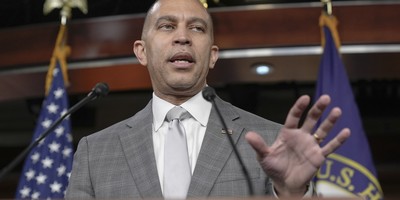Here's a crazy idea: Maybe the forces of liberty will win.
Sadly, few people are rooting for liberty these days, and even among those who are, there's a dismaying amount of pessimism about its prospects.
Consider China.
There's a new bipartisan consensus these days: The "elites" made a "bad bet" on China.
We were told by "elites" that giving China access to the global marketplace would deliver huge economic benefits for America. Simultaneously, economic liberalization in China would lead to political liberalization. After all, the history of democratization usually begins with growing prosperity. As the middle class gets richer, it demands rights and protections once enjoyed only by aristocrats -- i.e. political representation and the rule of law. This is how liberal democracy emerged in England and Holland in the 16th and 17th centuries, and in much of the rest of the free world since then. The same will happen in China, policymakers said. And since democratic societies tend not to go to war with each other, American and global security will improve.
And now, today's elites insist that it was all false.
While it's true that the benefits were oversold and the costs minimized, it's not clear to me that any of these claims are settled.
On the economic front, plenty of studies show that Americans benefitted from increased trade with China. Consumer goods got cheaper, particularly for lower-income Americans. Yes, America lost some manufacturing jobs to China -- though it almost certainly lost more to robots. But competition with China also yielded more hiring of Americans in non-manufacturing jobs, a much larger part of our economy. Perhaps this painful transition was necessary and inevitable. (For those interested, Duke Law School's Scott Lincicome authored an excellent survey of the economic literature at the Bulwark in January.)
Recommended
In short, the economic argument is a mixed bag. Though the fact that hundreds of millions of Chinese people were lifted out of abject poverty -- by markets -- is a moral victory for humanity and an important demonstration of the fact that police states alone don't make life better for the policed.
Which brings us to freedom. Beijing remains stubbornly -- and by some measures, increasingly -- authoritarian. It's not as bad as when Chairman Mao killed some 60 million of his own people, but China's technologically advanced police state is still plenty grotesque.
Why? A scholar who spent years in China once explained to me that the government -- i.e., the Communist Party -- is often more afraid of the people than the people are of it. The Communist Party understands the history of democratization as well as anyone. It's just betting that artificial intelligence and facial recognition will keep its aristocrats in power in ways that the bayonets and gunpowder of yesteryear could not.
China is in a nationalist phase, just as Germany, France, Italy and other former or would-be Great Powers were on their way to democracy. That poses very real dangers to the global order in the same way the nationalist movements of the 19th and 20th centuries did. Germany's Kaiser Wilhelm wanted what he called a "place in the sun" for the German empire, and so did Adolf Hitler. Chinese leader Xi Jinping wants it, too.
Whether it was a young political scientist named Woodrow Wilson hailing Otto von Bismarck's authoritarian Prussia as the most "admirable system ...and most nearly perfected" in the world, or Lincoln Steffens claiming upon his return from Soviet Russia that he'd "seen the future, and it works," or New York Times columnist Thomas Friedman wishing that America could learn from China's "one party authoritarianism," virtually every time nationalist and authoritarian regimes seize the reins, countless Western intellectuals became convinced that a better, more "efficient" model of government had been created.
As George Orwell observed, this sort of thinking amounts to power-worship, and this mindset leads people to think that current trends will only continue in a straight line into the future.
But that's not how the last three centuries have gone. Power-hungry experts love to tell us freedom has had its day, yet liberty keeps winning. The freedom fighters in 2019 Hong Kong may meet the same fate that the protestors in Tiananmen Square did in 1989. But that doesn't mean they'll be remembered as victims of a lost cause. Rather, they might be remembered as proof that liberty can win in the long run, when people fight for it.
The great lie about China wasn't that good things would come from its enrichment, but that the good things would be instantaneous -- and easy. Liberty is never easy. It takes work.

























Join the conversation as a VIP Member